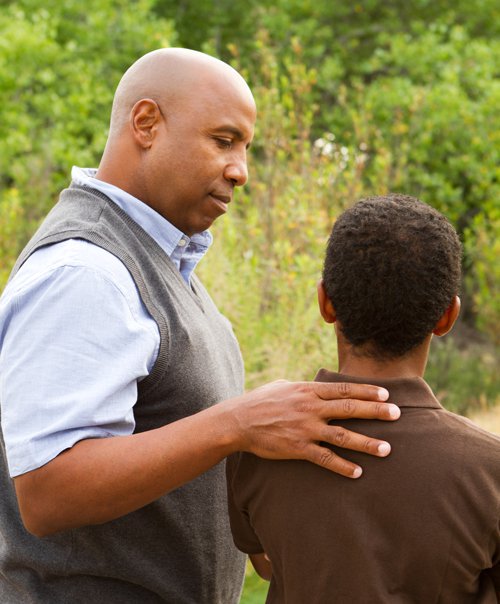Use these techniques to raise your child to stand firm against the allure of pornography.
Jace and Haylie were the quintessential golden couple. Jace was broad and tanned with the white-cotton blond hair of his Nordic ancestors. He played defense on the high school’s football team. Haylie was tall and slender with dark gold hair the color of wheat at harvest time. She was athletic and on the track and field team at the same high school as Jace. Together, they made a striking couple.
Often after school Jace would come hang out in his father’s engineering firm where I worked. He would hit his father up for some cash or play computer games on an extra computer no one was using. Jace’s mother laughingly told my wife that she and Haylie’s mother were already speculating on what any future grandbabies might look like, having two such striking looking parents.
One day, Jace’s father asked me to track down the source of computer problems we had been having at the office. The computers were networked, so whatever affected one computer, affected them all. The on-going virus problems seemed to come from the computer Jace spent time on at the office. When I dug deep into the computer, I discovered the cause of the problem. Although Jace had deleted his browsing history, he didn’t know all the ways to hide his on-line activity and I discovered he had been spending a lot of time downloading pornography.
 |
Porn negatively impacts relationships because it changes how the opposite sex is viewed. This, in turn, changes how they are treated.
|
I knew from first hand experience how addictive porn can be, so the next time Jace dropped by, I invited him into my office for a quiet, man-to-man talk. I told him what I had found and that I was concerned because it is so addictive. I warned him that if he continued to watch porn, it would change how he viewed girls and this would effect how he treated them. I told him this would ultimately screw up any relationship he tried to have with women. Jace thanked me for the warning and promised to quit.
Not long after that, Jace talked his dad into giving him the computer, since it was not being used at the office anyway, and he moved it to his bedroom at home. In the upcoming months, I noticed that the way Jace treated Haylie began to change. He was not as interested in spending time with her and he was not as kind to her as he had been before. He often spoke to her impatiently. Haylie did not understand why Jace had changed, but she sure didn’t like it. Half way through their senior year, Haylie broke it off with Jace. Their mothers, who were friends, were very disappointed, but I was not surprised. Porn changes you and not for the better. It had changed how Jace viewed Haylie and that, in turn, changed how he treated her.
Pornography is a trap. It is just as addictive as nicotine or alcohol and wise parents will do anything and everything in their power to prepare their child to resist the temptation when it is presented, because at some point, it will be.
The Porn Problem
Young people1 today face challenges previous generations did not. The Internet has made the most depraved pornography available at the click of a button. The problem is, watching porn changes the brain chemistry of the one who routinely views it.
There is a rising problem of pornography addiction in teens. The negative effects of pornography addiction is even greater in teens as their brains are more susceptible to the chemical overload effects that come with continued viewing. … Dopamine is a neurotransmitter that is central in our drive for personal reward. When teens take part in stimulating or potentially addictive habits, such as pornography, there is a flood of dopamine in the brain. With repetitive increases of dopamine released into the teen brain it is rewired to crave the same effect.
Teen brains are the most sensitive to dopamine at around age 15 and react up to four times more strongly to images perceived as exciting. A teen’s brain is at its peak of dopamine production and neuroplasticity, making it highly vulnerable to addiction and rewiring as their brain is not yet finished developing.
Sexuality specifically increases DetaFosB a protein that serves a role as a mediator in natural reward memory. This study also found that overexpression of DeltaFosB induced a hypersexual syndrome.2
Ultimately, the problem is not really pornography any more than it is alcoholism, drugs, or nicotine. The real problem is addiction. Long term use of porn actually results in a lowered sex drive as real women with normal bodies no longer hold appeal.
The men (and they are overwhelmingly men) who become hooked on this bilge are often miserable about it. They know that it affects their capacity to love and be loved by real women. As [psychiatrist Norman] Doidge explained, “Pornographers promise healthy pleasure and a release from sexual tension, but what they often deliver is an addiction, tolerance, and an eventual decrease in pleasure. Paradoxically, the male patients I worked with often craved pornography but didn’t like it.”3
Addictive behaviors provide escape from the pressures, stress, and even boredom, of daily living. Addiction provides escape from reality. This is the true danger of any addiction. If parents equip their children to know how to handle stress in constructive ways, young people will be less likely to seek the emotional crutch of escapism to deal with the pressures of normal daily life.
Barricading the Soul
The most important job in the world is that of being a parent. Parents are responsible to a large extent for the characters their children form. It is important for parents to equip a child with the tools to handle stress in constructive ways. Training your child to notice and be grateful for the small pleasures and blessings of daily life is also important.
Following are seven concrete ways to help a child, from a young age, form a character that will withstand the seductive allure of pornography. These same principles can apply to other addictive behaviors as well.
1. Provide children with a healthy view of married love.
Children who see their parents enjoying a healthy, romantic marriage are far more likely to grow up to have healthy relationships of their own. When your child sees Dad loving and appreciating Mom in a real-life, romantic relationship, a foundation is laid for healthy, realistic expectations in your child’s own life.
One of the best ways for the husband to highlight real beauty is for him to pursue his wife in the home. There needs to be a lot of hugging and kissing between the husband and wife. Release biblical sexuality and romance from its shameful prison and teach your children a biblical view of love.
Children need to see marital romantic affection. The dad can send a clear message to his children regarding what beauty is and what turns him on—though he would not say it this way to his children. Holding hands, dancing in the living room, hugging for long periods of time, and smooching in front of the kids are beautiful examples of who and what is worthy of a man’s love.4
2. A healthy home environment.
All addictions, including pornography, are methods for escape. Make sure your home is a welcoming refuge from the world, where love, warmth, support, and non-critical acceptance are always given to your children. Praising a child for his efforts and hard work, rather than for the finished product, will develop in him satisfaction in hard work. Ultimately, this will take the child further than simply praising for the final result, or praising a child for being smart. Youth get bored easily. When a child is praised for hard work and for the effort put into accomplishing something, a character is formed that finds satisfaction and enjoyment in hard work. Then, when the stress and challenges of the teen years come, they are less likely to turn to the emotional crutches of addiction to cope.
 |
In single-parent homes without a father, it is extremely important for the mother to establish early on a warm, supportive relationship with her son. He should feel he can talk openly and without embarrassment about any topic that concerns him. A calm, non-judgmental demeanor is necessary if you want your son to feel safe enough to confide in you.
|
If your home is not a warm, welcoming and encouraging place, your child will be drawn to find refuge elsewhere and porn provides an easy escape. Home should be a place to escape to, not from. Within the framework of home as refuge, a young person should be taught healthy techniques for coping with stress. These range from getting sufficient sleep, a healthy diet, and exercise, to prayer and trust in divine power.
3. Teach your child the importance of deferred gratification.
When I was 14, my parents took my brother and me on an extended overseas trip. It was my first trip out of North America and the culture shock was huge. One of the things that really shocked my young mind was the general attitude people in the other country had toward work. Where I was raised in the US, the Puritan work ethic was very much “Work now, play later (if there is no more work to be done).” In the country we were visiting, however, the attitude was “Play now, work later (maybe—unless we can play more later).” It was a culture of instant gratification.
It is extremely important to your child’s character development to instill the principle of deferred gratification. Porn is readily available on the Internet. It is certainly easier to access pornography than to develop and maintain personal relationships in the real world. A teenager who gets gratification from viewing porn on line, will grow into a man that finds it easier to pleasure himself while viewing porn, than put the love and effort in to pleasuring his wife, letting her, in turn, give him pleasure.
“When children run the home by easily persuading their parents to give them the desires of their heart, then there is nothing to stop the child from getting into porn if the opportunity arises. And the opportunity will arise.
“[A recent statistic] said out of 813 adults from 18-26, two out of three agreed pornography viewing was acceptable. 86% of the men and 32% of the women used porn. The percentage among women is growing. I think we all agree porn is exponentially easier to access than it was just ten years ago. If the child is set up to get his selfish desires met, it won’t be hard for him to be allured by porn.”
(Rick Thomas, author and counselor)
|
Deferred gratification is a principle that is taught early childhood when a child is taught to obey when Mommy or Daddy says, “No.” Children given everything they ask for develop characters that expect to be granted their every wish. Too many parents use distraction in the early years of childhood. “Distracting” a child, rather than teaching him to learn “No,” is one of the most harmful ways a parent can raise a child. It actively teaches instant gratification: “I don’t want him having this, so I will entice him away with something he finds even more attractive and desirable.” This does not develop strength of character in the child! It only entrenches the belief that he can have anything he finds desirable. Further, it encourages a short attention span that is easily bored.
A child allowed to indulge in instant gratification, bored by anything that requires commitment and hard work, will grow into a self-indulgent adult who seeks for nothing more than instant gratification in all areas of his life.
4. Teach your child that actions have consequences.
A child that is never held accountable for what he does wrong, grows into an adult that knows how to get away with anything, including lying to his wife, and even blaming her for his addiction. This will impact every other area of his life, including his spiritual life.
This starts in babyhood when a child is not taught to obey the very first time Mommy or Daddy says to do something. Some children are taught they can disobey as long as Mommy is still counting: “One … two … two-and-a-half …two-and-three-quarters-I’m-almost-to-threeeee!” And just that fast, the child has just been taught he can disobey until that point. Other children are taught they can disobey until Daddy’s voice reaches a certain decibel.
Children should be taught to obey the very first time they are told to do something in a pleasant tone of voice. Otherwise, they are being actively taught to get away with disobedience until Daddy is yelling or Mommy has counted to “two-and-three-quarters”.
Children who are taught clear, reasonable boundaries and who know they are loved, are happy, secure children. A spoiled child who has never been held accountable for doing wrong will grow up thinking rules and laws (including Yahuwah’s laws) do not apply to him. Such an entitled mental attitude is an open invitation to porn addiction.
5. Actively instill the values you do want in your child.
Christian parents are frequently accustomed to thinking of their child as a garden. Exhausting efforts are put into rooting out every unsightly weed that dares rear its ugly head in the fertile ground of their child’s heart. The problem is if all you ever do is weed, you will simply end up with a barren plot of dirt. To have a beautiful and productive garden, requires more than just weeding.
A beautiful garden will have a variety of flowers and vines that look lovely and smell good attracting butterflies and birds. A productive garden will also have fruits and vegetables for nourishment as well as medicinal herbs that can be used in a variety of productive ways. But having more than a barren plot of dirt, takes work. It requires planning. It also requires actively instilling what you do want and then nurturing what has been planted.
What sort of young adult do you want your child to be when he is 18? Do you want him to be polite, respectful towards women, hard working, kind toward others, and protective of those who are smaller and weaker than himself? Than you need to start planting those things in his character from early childhood and actively nurture them as he grows.
6. Have an honest talk with your kids.
Never, ever, ever lie to your kids. Let them grow up knowing they can always come to you for the truth. If something is not age appropriate, you can tell them that you will answer their question when they are older. Refusing to answer a question is one thing. But lying is something else altogether and will destroy their trust in you.
Start having open, age-appropriate conversations with your kids from a young age. If they cannot come to you for information, they will get it from their peers and that is certainly not a safe place for learning Christian values.
 |
Talk honestly with your kids. You want them to learn their values from you, not their peers.
|
With open communication established, explain the dangers of pornography to your growing kids. In today’s world, pornographic images are so easy to access online, you will need to have this talk before they hit puberty. My youngest daughter recently stumbled across a picture on line that really upset her. She is only 11 and was looking up pictures of pretty and unusual animals such as longhaired rabbits, and other similar images. All of a sudden, while she was looking up images for the world’s largest dog, an image of a decapitated body popped up. That was not the sort of image she was searching for, but it came up anyway.
The extremely graphic nature of the image was very upsetting to her and bothered her for months. Certain things would trigger the memory of what she had seen, and she would get upset all over again. Pornography also repeatedly pops up in totally seemingly unrelated searches. Something as innocent as looking up cute little fashions for dogs can pull up disgusting hard core porn. Webmasters for pornographic sites take advantage of various key words to suck people into their sites.
Tell your kids the danger of pornography! Don’t let your discomfort over the topic leave your kids ignorant of the dangers. Explain that the best way to avoid addiction is to never try it in the first place!
You can even implement some statements of conviction:
First Conviction: I understand that pornography is an addictive sin that can destroy any hope I have for a happy, fulfilling marriage someday.
Second Conviction: I am accountable to Yahuwah and will be accountable to my parents for what I put in my mind through books, movies, the Internet, and what I listen to.
You are the parent. It is your job to monitor the child’s entertainment. If you don’t, you will not know what they are being exposed to. The long-term consequences of neglecting your role as parent when the child is young can be loss of jobs, loss of marriages, and a deeply unhappy, dissatisfied life when your child reaches adulthood. The habits learned in childhood, for good or for evil, stay with and influence a person all life long.
7. Teach your child self control.
Of all the principles listed here, this is arguably the most important. A child that is taught self-control will grow into an adult that puts the law of Yah ahead of personal desire, and duty ahead of personal gratification. People who are not taught self-control in childhood have it imposed on them when they are older by external forces.
- A teenager that lacks the self-control to diligently study receives lower grades and, later, has fewer opportunities in the job market.
- An adult that lacks the self-control to give an honest day’s work for an honest day’s wage is passed up for promotions at work or is outright fired.
- Worst-case scenario, an adult that has no self-control will end up in prison. The state imposes the control he lacks by removing his freedom of choice and incarcerating him.
Self-control begins with the baby in his mother’s arms. An 18-month old that is allowed to throw a temper tantrum and yell, and scream, and kick, is being taught lack of self-control by default. An 8-year old that is allowed to be rude to his brothers and sisters when he is sick and not feeling well, is being taught lack of self-control by default. A 14-year old that is allowed to raise his voice and yell when angry is being taught lack of self-control again, by default. Anyone can yell when angry. It takes no strength of character to lose one’s temper. However, it takes a great deal of self-control and a strong character to maintain one’s composure and self-control when provoked.
 |
Parents who do not require their child to exercise self-control do a great disservice to the child that will exact a high price later in life.
|
Failing to teach self-control is one of the greatest disservices a parent can do to a child. It carries over into every single area of life, including the spiritual life. Surrendering the will to Yahuwah, refusing to indulge in sinful behavior when you really, really want to, requires strength of character that only comes from self-control.
Maybe you do not have the will power to overcome the temptation on your own. We all have areas that require divine assistance to over come. But it takes the learned behavior of self-control to choose, at that point, to turn to Yahushua for help when tempted, rather than give in to the desired temptation.
Where sin begins
Sin always starts first in the mind. It is harbored in the imagination. Then, when an opportunity presents itself, temptation without meets corruption within and the person sins. This can be directly traced back to a lack of self-control.
One of your greatest jobs as a parent is to instill in your young child the principles of self-control. He can never reach the stature of a true man in Yahuwah as long as he is enslaved to the changeable desires of his lower nature.
When man is a partaker of the divine nature, the love of . . . [Yahushua] will be an abiding principle in the soul, and self and its peculiarities will not be exhibited. But it is sad to see those who should be vessels unto honor, indulging in the gratification of the lower nature, and walking in paths that conscience condemns. The corruption within unites with the corruption without, and men professing to be followers of Christ, fall to a low level, always mourning over their shortcomings, but never overcoming, and bruising Satan under their feet. Guilt and condemnation constantly enshroud the soul, and the cry of such might well be, “O wretched man that I am, who shall deliver me from the body of this death?” Through indulgence in sin, self-respect is destroyed; and when that is gone, respect for others is lessened, because we are under the impression that others are as unrighteous as we are ourselves.5
If your child is already watching porn
Even in the godliest homes, with the most careful parenting, youth can still fall prey to the seduction of pornography. This does not make you a bad parent. Lucifer rebelled in Heaven! However, be aware that what you are dealing with is a true addiction.
Dr. Donald L. Hilton, Jr., urges:
[We need to] treat pornography and sexual addiction as a full addiction, and not from a behavioral/spiritual perspective alone. … Individuals struggling with pornography and sexual addiction must understand that because this is a true addiction, they will not be able to stop unless they seek help from appropriate sources. The rationalization that “this is my private sin, and I can resolve it privately with God” will only produce escalation of the addiction, and entrench them in a double life. They must have the personal desire to seek and obtain repentance and recovery.6
If you discover that your child has become ensnared in pornography, there are some specific things you can do to help free them.
A) Do not respond with anger, disgust or emotional tears. Do not seek to shame or humiliate your child. Children and youth are younger members of the royal family of heaven and should be accorded dignity and respect.
 |
If your child is already struggling with a porn addiction, give him the kindness and understanding you want Yahuwah to give you when you fail.
|
B) Do be calm, kind and understanding. Treat your child just as you want Yahuwah to treat you when you make a mistake. If you, too, have struggled with pornography, you can share what has helped you overcome. Let your child know he (or she) is not alone.
C) Encourage and nurture your child’s trust. Now is not the time to parent with “tough love.” Parents who govern youth with “tough love” will punish even if he has confessed and apologized. Pornography, by its very nature, is a hidden, secretive vice. Do not give your teenager a reason to be even more secretive. Tough love only encourages youth to lie because they know they will be punished anyway, even if they tell the truth. Be a safe haven for your child to come to if he is struggling and needs help.
D) Explain the dangers and problems with pornography. Tell your child how watching pornography actually affects the brain chemistry.
E) Get a qualified counselor skilled in dealing with sexual addiction to work with your child. Remember, because of the changes in brain chemistry, you are dealing with a true addiction.
F) Limit computer access.
G) Keep your child occupied and physically active. Eliminate or reduce the intake of foods that stimulate and excite the lower nature (meats, eggs, excess sugar, caffeine, etc.)
H) Never, ever “write your child off” as lost. It does not make you a bad parent if you discover your child has become addicted to porn. All humans are guaranteed freedom of choice.
I) Pray, pray, pray for your child. Praying for your child is a divine mandate. When Israel insisted on having a king to be like other nations, Samuel’s inspired response is an example for every parent dealing with a struggling child: “Moreover, as for me, far be it from me that I should sin against Yahuwah in ceasing to pray for you; but I will teach you the good and the right way.” (1 Samuel 12:23, NKJV) If you are not praying for your child, who is?
Helping your child overcome
Author Rick Thomas observed: “The problem for many of us is we do not understand the insidious allurement of pornography and how our behavior, though unintentional, can help shape a child to crave something which can lead him into a lifetime of slavery.”7 Many youth stumble across pornography and become addicted through default. If they are never taught self-control, if they are never held accountable for their actions, if the home environment is not a supportive refuge from the world, youth are far more susceptible to being drawn to the escape offered by pornography. Intentional parenting—knowing the kind of adult you wish your child to be and working toward that goal—is necessary if our children are to be over-comers.
A child who is taught to make his decisions based on principle, rather than feeling, will grow to be an honorable man who lives a principled life. Even if your child is almost grown, it is not too late to begin equipping him with the tools to live a godly, honorable life in the fear of Yahuwah.

1 This article is written from the perspective of the need to guard young men and boys from the dangers of pornography. Parents should be aware, however, that a growing number of girls have been drawn into watching pornography as well. The principles outlined in this article are equally true for young women or young men.
3 Donald L. Hilton, Jr., MD, He Restoreth My Soul, chapter 4, emphasis supplied.
5 Ellen G. White, Review & Herald, June 30, 1891.
6 Hilton, op. cit., Introduction.
7 “5 Sure-fire Ways to Motivate Your Child to Use Pornography.”
No comments:
Post a Comment